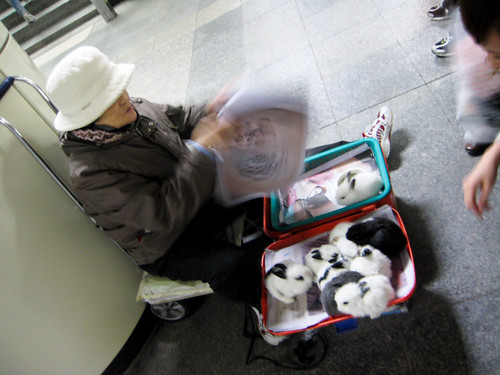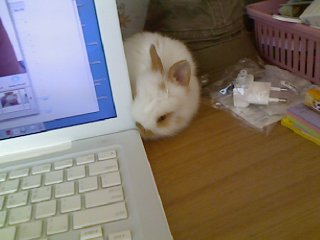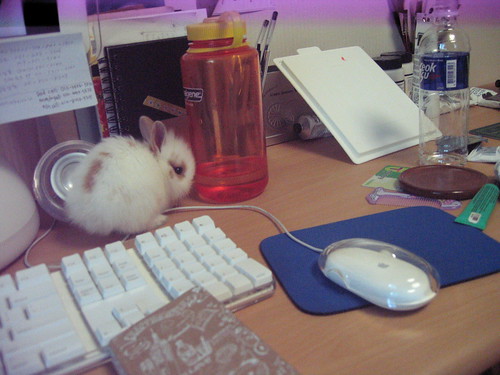
Have you seen this scene before?
As many of you know, I have an adorable rabbit named 'Bunny,' who I absolutely love to bits. I got her about 2.5 years ago from this one halmunee ('granny' in Korean) who was selling them for 15,000 won each in a subway station. If you live in Seoul, I'm sure you've seen her, or another seller just like her, surrounded by a crowd of people admiring and touching the bunnies.
Unfortunately, when I got Bunny from her, I was not yet vegan and didn't understand the entire scope of animal cruelty and exploitation, and I had never even questioned the idea of having animals as 'pets'. I also wish I had known more about rabbits before I bought Bunny because then I would've known not to support such a business.

Bunny, the day after we met
As if the cute-factor isn't hard enough to resist, these types of 'street sellers' tell lies to make their profit. I have run into them numerous times, and have listened to them give the exact same sales pitch to all of the observers. Here are 2 ways in which they misleads customers:
#1:
They tell people that the bunnies are almost fully grown, and that they will not grow much larger in size. In reality, the bunnies in the baskets are still babies and have many more months before they are full adults. A lot of people are enamored by the idea that the rabbits will stay small like teacup bunnies, and buy them. This also gives people the impression that these bunnies are small enough to be kept in little cages like hamsters, and that they are fairly low-maintenance. On the contrary, these rabbits require a lot of attention and they do grow pretty big.
#2:
When people ask what to feed the bunnies, they are told that they only have to be fed a teaspoon-sized amount of pellets every day. This couldn't be more wrong. First of all, bunnies have to eat way more than that, and more importantly, they cannot be healthy on mere pellets alone. Infact, pellets should only be a small part of their diet. Never do they tell the customers that the rabbits have to be fed hay (especially alfalfa hay for bunnies this young) and fresh greens. If customers heard that, they would probably be deterred from buying the rabbits, since they wouldn't know where to get the hay, or they wouldn't want to deal with the mess.
They also know exactly how to exploit people's emotions and the cuteness of the bunnies for her profit. For example, the old lady in the picture above pretends to care about the rabbits by kissing them and rubbing them against her cheek, but you can just tell by the way she sort of tosses them around, that she doesn't care for their real well-being. It truly saddens me every time I run into her. I can only imagine what kinds of conditions these bunnies, and the mother/father bunnies live in, back at her house/farm factory. And what happens to the ones that don't sell? Do they go towards animal testing? Do they get their fur ripped off their faces for fashion?
BTW, the old lady in the picture wouldn't even let me take a photo of her and the bunnies! I had to sneak that one shot of her I got, which is why it's kinda blurry. Hm, does she feel guilty or afraid of something?

I actually know about 3 other people who bought bunnies on the street at different times, but all of theirs died in about a week- most likely because they followed this kind of ill advice of how to care for them. So sad. My rabbit is the only one I know to have survived- an accomplishment I attribute only to the fact that I went home and did my own research on rabbit-care.

Bunny today
While I would never trade Bunny for anything, I just wish I had known back then to never 'purchase' a companion animal, but to adopt instead. When I am financially able to support another rabbit (and when I have a larger space), I will most definitely adopt. And if Bunny and I are still in Korea when that time comes, I will probably go to Animal Rescue Korea (ARK) and look at their listings for adoptable animals. It's a great website and there are some wonderful, heart-warming stories of animals finding good homes.

To end on a positive note, meeting Bunny has been a true blessing in my life. Although I wasn't aware of it at the time, looking back, I have no doubt that my relationship with Bunny played a role in my eventual journey from vegetarianism to veganism. Whether it was subconscious or not, seeing this sentient being running around my apartment, definitely had an affect on me. How could I love and want only the very best for Bunny, and yet turn a blind eye to the suffering of other animals? She was my first vegan friend, and I look forward to us growing old together. :)
If you are interested in learning more about bunnies, please check out Colleen Patrick-Goudreau's podcast eposide entitled 'Rabbit Tales.' It's really informative and well-put.